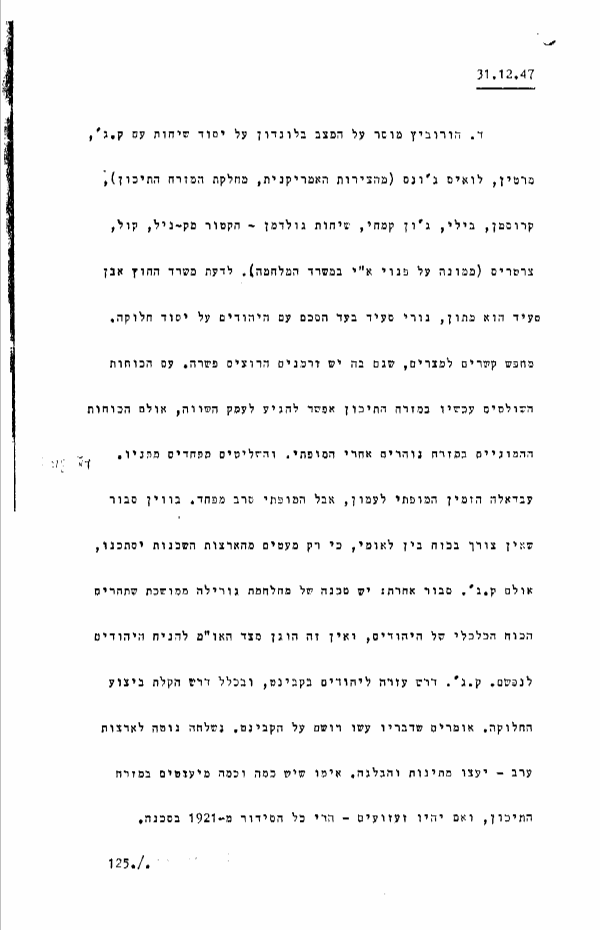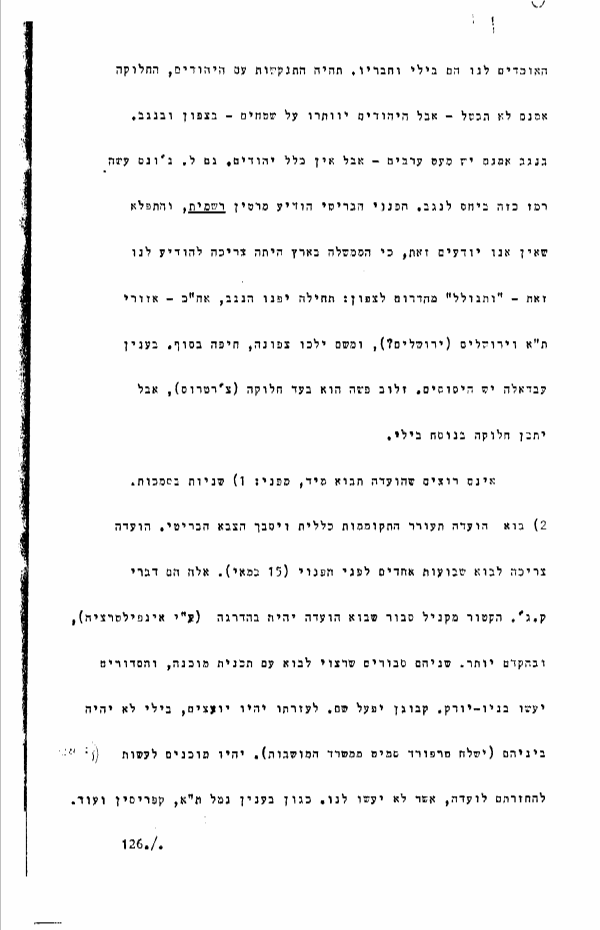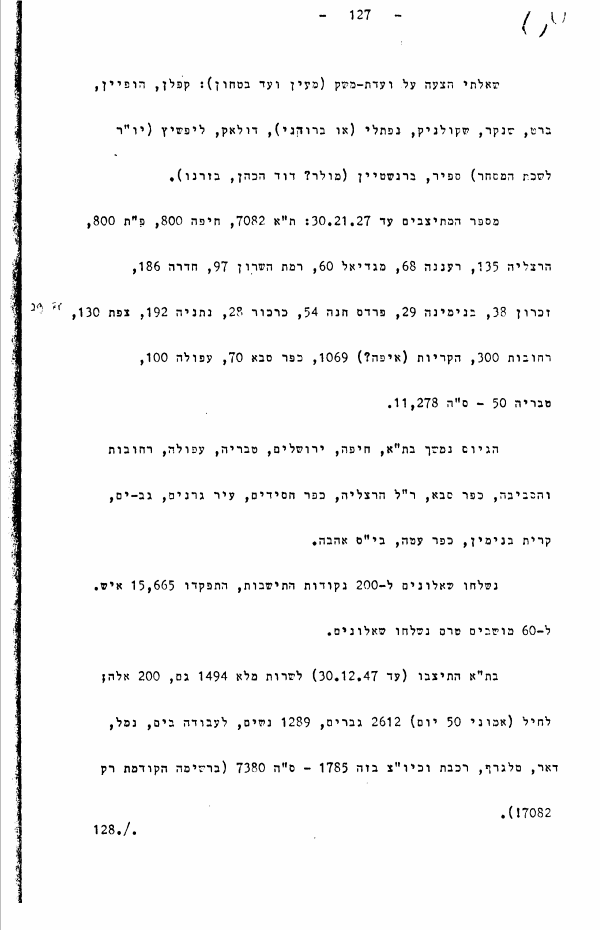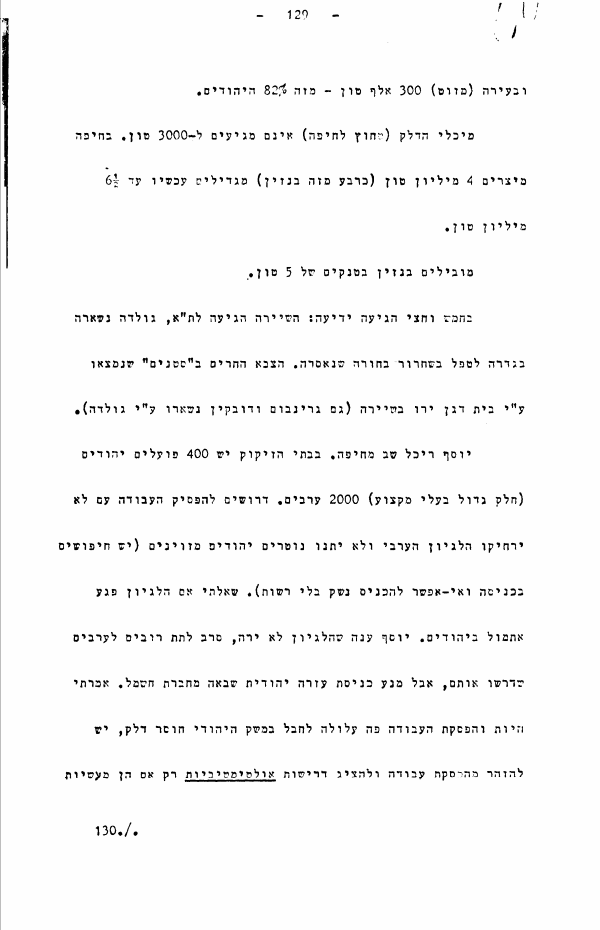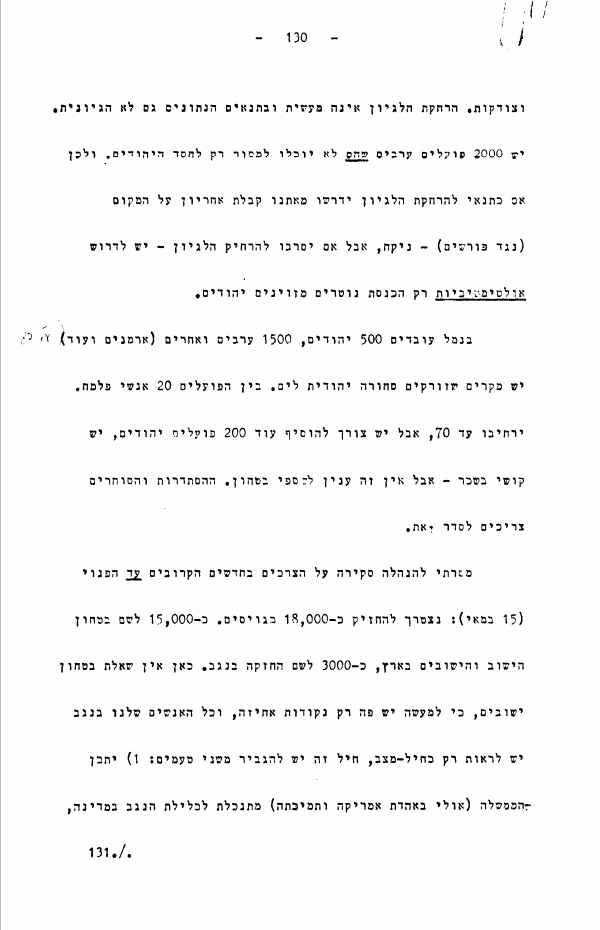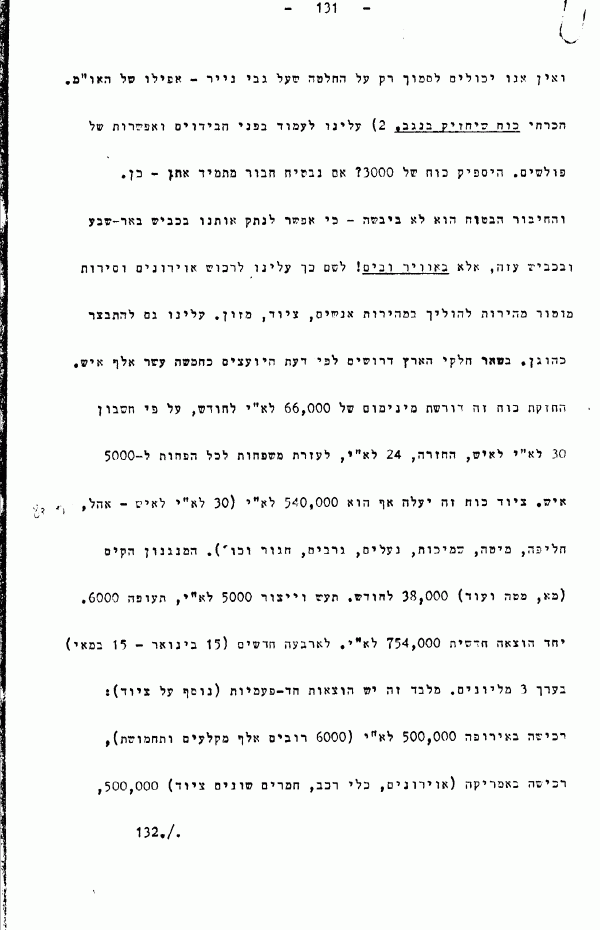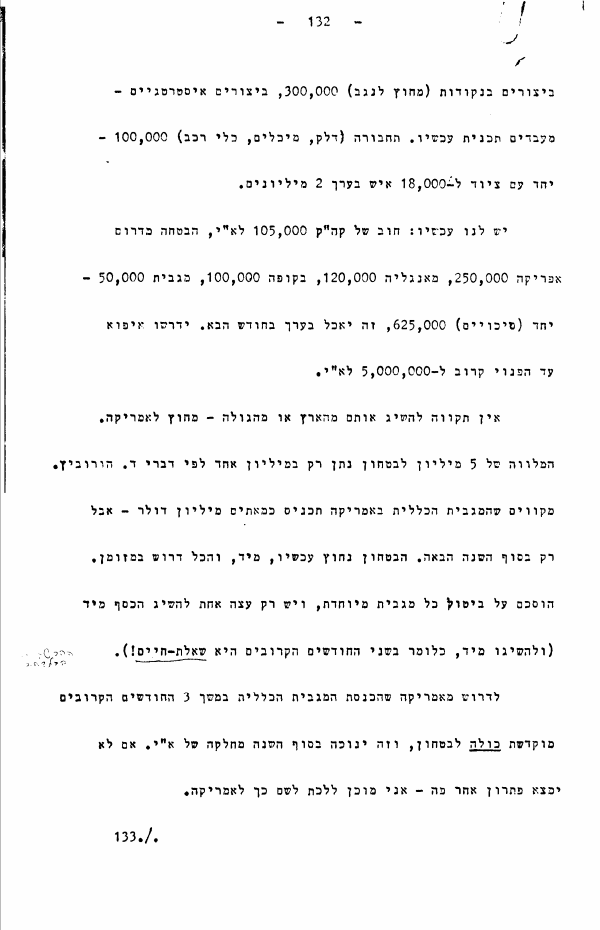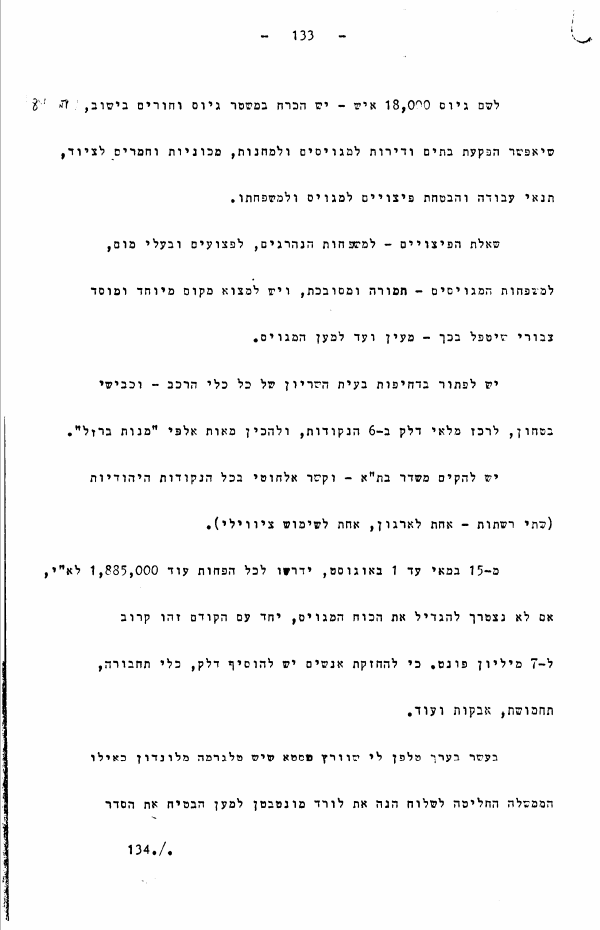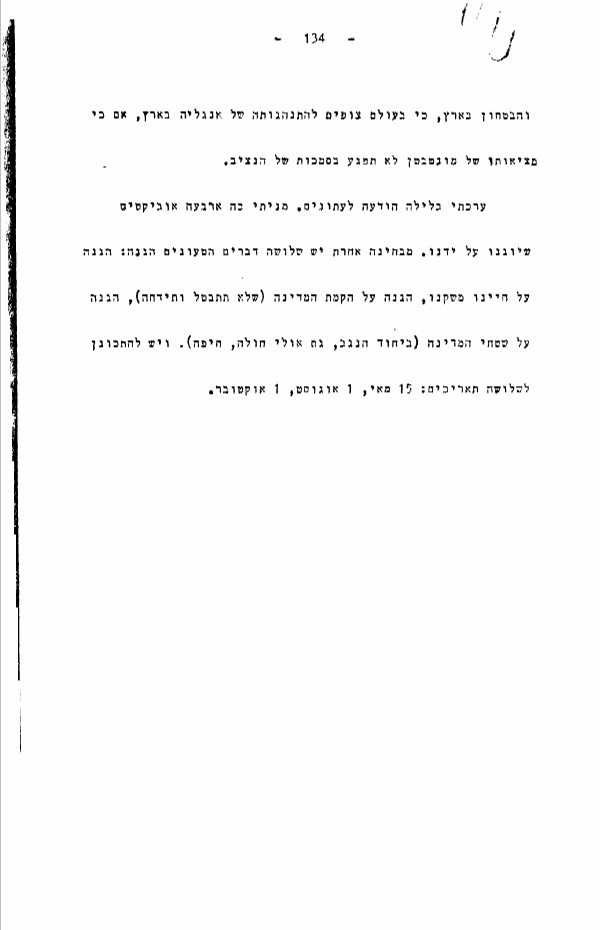1
of
Places:
al-Masmiyya al-Saghira
Allonim
England
United States
Haifa
Jerusalem
London
Egypt
Magen
Binyamina – Giv'at Ada
Herzliya
H̠adera
Magdiel
Ra'ananna
Ramat HaSharon
Tverya
Kfar Sava
Karkur
Pardes Hanna
Netanya
Safed
Reh̠ovot
Afula
Kfar A'ta
H̠ulda
Kawkaba
Sarona
Moledet
Bet Dagan
Gedera
H̠ura
Gaza
Amman
New York
Gevim
The use of the photograph is subject to the Copyright Law, 2007
31.12.1947
219122
[Thursday,] December 31, 1947 D. Horowitz reports on the situation in London, on the basis of conversations with Creech-Jones [secretary of state for the colonies], [John] Martin, Lewis Jones (from the American Embassy, Middle East Department), [Richard] Crossman, [Harold] Beeley, [journalist] Jon Kimche, and [Nahum] Goldmann’s conversations [with] Hector McNeil and Colonel Charteris (in charge of the withdrawal from Eretz Israel in the War Office). The Foreign Office is of the opinion that Ibn Saud is a moderate. Nuri Said [of Iraq] supports an agreement with the Jews on the basis of partition. Is seeking contacts with Egypt, which also has sectors that want compromise. It’s possible to reach an agreement with the current ruling powers in the Middle East, but the powers of the masses in the East are flocking after the Mufti, and the rulers are afraid of him. Abdallah invited the Mufti to Amman, but the Mufti declined out of fear. [Foreign Secretary] Bevin thinks there’s no need for an international force, because only a few of the neighboring countries will take the risk [of war], but Creech-Jones thinks differently: there’s a danger of prolonged guerrilla warfare that will destroy the Jews’ economic power, and it’s unfair of the UN to leave the Jews on their own. [Creech-Jones] called on the Cabinet to help the Jews, and generally called for easing the implementation of partition. They say his remarks made an impression on the Cabinet. A dispatch was sent to Arab countries – advising moderation and forbearance. They threatened that there are quite a few minorities in the Middle East, if there are shockwaves – then the entire arrangement [brokered by Churchill] from 1921 is in danger. Our enemies are [Harold] Beeley and his friends: [In their assessment] there will be a clash with the Jews; although the partition won’t be abandoned – the Jews will concede territories – in the north and the Negev. Admittedly the Arabs in the Negev are few – but there are no Jews at all. L. Jones [the American] also implied as much with regard to the Negev. [Regarding the decision on] the British withdrawal – Martin officially announced it, and was surprised that we didn’t know this, because the government in the country was supposed to inform us about it. [The withdrawal] “will roll out” from the south to the north: first they’ll pull out of the Negev, then the regions of Tel Aviv and Jerusalem (Jerusalem?), and from there they’ll go northward, and finally Haifa. Regarding Abdallah there are reservations. Glubb Pasha supports partition (according to Charteris), but possibly partition as formulated by Beeley. They do not want the [UN Palestine] Commission to come right away because: 1) duplication of authority. 2) the Commission’s arrival will spark a general [Arab] uprising and embroil the British army. The Commission should come a few weeks after the withdrawal (May 15). These are Creech-Jones’s remarks. Hector McNeil believes that the Commission’s arrival will be incremental, through infiltration [i.e., by individual members arriving “quietly”] and sooner. Both of them believe that it’s best to arrive with a prepared plan, and that the arrangements be made in New York. Cadogan [British ambassador to the UN] will do the work there. He’ll have advisors to help him. Beeley won’t be among them (Trafford Smith of the Colonial Office will be sent). They’ll be willing to make concessions to the Commission that they won’t make to us: such as regarding the Tel Aviv port, Cyprus [allowing the entry of clandestine immigrants encamped in Cyprus after the British seized their ships], etc. According to McNeil [the British] are interested in evacuation [of the clandestine immigrants from the camps] in Cyprus: via payments [?], permits for children and all sorts of other ploys, because the camp [there] has been promised to the army. The withdrawal from Eretz Israel means leaving the entire East. They still hope that the Americans will enter. They’re having problems obtaining information from the Arabs – in contrast they have precise minutes from the [Jewish] Agency Executive (in Jerusalem? In New York? Unclear!). There was an “informer” in the [Agency] office in New York. This [information] reached us from Arab sources. L. [Lewis] Jones [the American] opposes arming the Jews and the use of heavy weapons and the provision of weapons by America: if the Jews [don’t] have heavy weapons – the Arabs won’t use these weapons either. The reputation of the UN protects the Jews. L. Jones is influenced by the British, loyal to the American S.D. [State Department], although at the personal level he’s friendly. According to him the British are interested in negotiations with the Commission, and they might make concessions to the Commission. In his opinion it would also have been possible to compromise with Arab leaders – but everything depends on the Mufti. The F. O. [British Foreign Office] advised the Cabinet to vote against partition [in the UN]. This advice wasn’t followed [the UK abstained]. Preparations that need to be made for talks between the Commission and England: [addressing] the proposal for a [provisional Jewish] government, the demand for [free!] weapons, for food supplies (from the Anglo-American Committee), clearing the port [in Tel Aviv, in early February] for ‘aliya, maintaining the status quo of currency. I asked about a proposal for an economic commission (along the lines of the Defense Committee): Kaplan, Hoofien, Barth, Shenkar, Shkolnik [Eshkol], [Peretz] Naftali (or [Izaak] Brudny [Yitzhak Bareli]), Dolik [David Horowitz], [Shaul] Lifschitz (chairman of the Chamber of Commerce), Yosef [Sapir], [Peretz] Bernstein, ([Erich] Moller [ATA co-owner]? David Hacohen, Bjarano [Asis co-owner]). The number who have reported for duty as of December 30, 1947: Tel Aviv 7,082, Haifa 800, Petah Tikva 800, Herzliya 135, Ra’anana 68, Magdiel 60, Ramat HaSharon 97, Hadera 186, Zikhron [Ya’akov] 38, Binyamina 29, Pardes Hannah 54, Karkur 28, Netanya 192, Safed 130, Rehovot 300, the Krayot [a cluster of townships outside Haifa] (where?) 1,069, Kefar Saba 70, Afula 100, Tiberias 50 – total 11,278. Conscription is continuing in Tel Aviv, Haifa, Jerusalem, Tiberias, Afula, Rehovot and surroundings, Kefar Saba, Rishon LeZion, Kefar Hasidim, Ir Ganim, Gevim, [?] Kiryat Binyamin, Kefar Ata, Ahava School. Questionnaires were sent to 200 settlements; 15,665 people have been counted. There are 60 settlements to which questionnaires haven’t been sent yet. In Tel Aviv (as of December 30, 1947) 1,494 men [and] 200 women have reported for full duty; for Hayish (50 days of training) 2,612 men, 1,289 women. For work at sea, the port, the postal service, telegraph, railway, and the like 1,785 – in total 7,380 (the previous list had only 7,082!). – I clarified the issue of the houses in Sarona with “James” [Michael Ben-Gal – Rabinowitz]. There are only 86 houses there, rather than 118. The government is occupying 24, leaving 62 for us. Of these, James agreed to give 8 to Rokach [for the municipality]. I sensed that he doesn’t want me to demand them back. The government houses are not scattered but rather in an entire section. – Bar-Kochba [Meirovitz] received a list of boats and ships from Abba [Khoushy]. There is also a ship for sale or lease. – Construction began yesterday on the Moledet road [from Holon to Rishon LeZion] – there’s hope it will be finished next week. This is a temporary arrangement. They started to prepare the way from Hulda to the Masmiyya [– Latrun] road. – In the afternoon a “meeting” of the administration. The Jerusalem members – Gruenbaum, Golda, Fishman [Rabbi Maimon] – didn’t come. Present were M. Shapira, P. Bernstein, D. Remez, M. Kolodny [Kol], Moshe [Sharett], and D. Horowitz. Moshe and Dolik [Horowitz] delivered a report. In the middle of the meeting (at 5 p.m.) a message arrived that the convoy transporting Golda, Gruenbaum, [and Yitzhak] Ben-Zvi was inspected by the army on the Masmiyya road, weapons were found, people were arrested. Golda was there. She’s asking that [First Secretary] Gurney be informed of this. – In earlier records I found a list regarding fuel: the country consumes half a million tons of fuel per year. Gasoline alone – 84,000 tons, of this 60% Jews (4,000 tons per month), kerosene – 108,000 tons – half of it the Jews. Fuel and incendiary material (mazut) 300,000 tons – of this 82% the Jews. The fuel containers (outside of Haifa) do not reach 3,000 tons. In Haifa [the refineries] produce 4 million tons (about a quarter of this is gasoline). Now they’re increasing to 6½ million tons. They convey the gasoline in tankers of 5 tons. – At 5:30 [we] received news: The convoy [from Jerusalem] had reached Tel Aviv. Golda remained in Gedera to handle the release of a young woman who’d been arrested. The army confiscated the Stens that it found. Near Beit Dajan the convoy came under fire (Gruenbaum and Dobkin also stayed with Golda). – Yosef Rochel [Avidar] returned from Haifa. There are 400 Jewish workers (many of them professionals) and 2,000 Arabs at the refineries. They’re calling for a halt to work if the Arab Legion isn’t removed and armed Jewish notrim [British-appointed auxiliary police] aren’t provided (there are searches at the entrance, and weapons can’t be brought in without permission). I asked if the Legion hurt any Jews yesterday. Yosef replied that the Legion did not fire, refused to give rifles to Arabs who demanded them, but barred entry to Jewish aid that came from the electric company. I said: Given that a halt to work here could sabotage the Jewish economy for lack of fuel, we need to guard against a halt to work, and to present ultimatums only if they’re practical and just. Removal of the Legion isn’t practical and under the circumstances not logical either. There are 2,000 Arab workers that they won’t be able to abandon to the mercy of the Jews. Therefore, if as a condition for the removal of the Legion they demand that we take responsibility for the place (against attacks by secessionists) – we’ll take it. But if they refuse to remove the Legion – the only ultimatum we should present is the addition of armed Jewish notrim. – The port has 500 Jewish workers, 1,500 Arabs and others (Armenians etc.). There are incidents of Jewish merchandise being thrown into the sea. Among the workers there are 20 Palmach men. They will increase to 70, but it’s necessary to add another 200 Jewish workers. There’s a problem with wages – but this is not a matter for defense funds. The Histadrut and the merchants need to sort this out. – I presented the administration with a survey of needs for the coming months up to the withdrawal (May 15): We’ll need to maintain about 18,000 conscripts. About 15,000 for the defense of the Yishuv and settlements in the country, about 3,000 in order to have a hold in the Negev. Here it’s not a question of defense of settlements, because in practice there are only strongholds here, and all of our people in the Negev should be seen only as a garrison force; this force has to be increased for two reasons: 1) It’s possible that the government (maybe with America’s sympathy and support) is scheming against the Negev’s inclusion in the state, and we cannot rely only on a resolution on paper – even of the UN. It’s imperative to have a force that will hold onto the Negev. 2) We must face Bedouins and the possibility of invaders. Will a force of 3,000 suffice? If we guarantee a constant connection with it – yes. And the most secure connection is not by land – because we can be cut off at the Beersheva road and the Gaza road – but by air and sea! For this we must purchase airplanes and fast motorboats to quickly transport people, equipment, food. We must also fortify properly. The other parts of the country require, in the advisors’ opinion, about 15,000 men. The upkeep of such a force requires a minimum of P£ 66,000 per month, based on a calculation of P£ 30 per person, P£ 24 for family support, for at least 5,000 men [families]. Equipping this force will in itself cost P£ 540,000 (P£ 30 per person – tent, uniform, bed, blankets, shoes, socks, stove, etc.). The existing apparatus (National Headquarters, General Staff, etc.) 38,000 per month. Ta’as [home manufacture of weapons] and production P£ 5,000, air transport 6,000. In sum – monthly expenditure P£ 754,000. For four months (January 15 – May 15 [the end of the British Mandate]) about 3 million. Aside from this there are one-time expenses (in addition to equipment): procurement in Europe P£ 500,000 (16,000 rifles, a thousand [light] machine guns, and ammunition); procurement in America (airplanes, vehicles, various materials, equipment) 500,000; fortification of settlements (outside of the Negev) 300,000; strategic fortifications – a plan is currently being formed. Transport (fuel, containers, vehicles) 100,000 – along with equipment for 18,000 men about 2 million. We currently have [for defense]: KKL debt of P£ 105,000, pledge from South Africa 250,000, from England 120,000, in the account 100,000, fundraising campaign 50,000 – all together (likely) 625,000. This will be used up roughly over the next month. Thus by the withdrawal we’ll need close to P£ 5 million. There’s no hope of obtaining this from the country or from the Golah [place of exile, i.e., Diaspora] – outside of America. The loan of 5 million for defense provided only 1 million, according to D. Horowitz. [We’re] hoping that the UJA in America will bring in about $ 200 million [approximately P£ 50 million] – but only at the end of next year. Defense is needed now, immediately, and everything has to be in cash. It was agreed that the special fundraising campaign would be canceled, and there is only one suggestion for obtaining the money immediately (and obtaining it immediately, that is, over the next two months, is a matter of life!): To demand in America that the income from the UJA over the next three months be devoted entirely to defense, and this will be deducted at the end of the year from Israel’s portion. If no other solution is found here – I’m prepared to go to America for this. In order to conscript 18,000 personnel – it’s imperative to have a regime of conscription and [state of] emergency in the Yishuv, which will allow for the confiscation of houses and apartments for conscripts and for camps, vehicles and materials for equipment, working conditions and guaranteed compensation for the conscript and his family. The question of compensation – for the families of those killed, for the wounded and disabled, for the families of conscripts – is serious and complicated, and we need to find a special source and public institution to handle this – some sort of committee for the conscript. It’s urgently necessary to resolve the problem of armoring for all vehicles – and security roads, to concentrate fuel reserves at 6 points, and to prepare hundreds of thousands of “iron rations” [?]. [We] need to establish a broadcasting facility in Tel Aviv – and wireless signal for all the Jewish settlements (two networks – one for the Organization, one for civilian use). From May 15 until August 1, at least P£ 1,885,000 will be required – if we don’t have to increase the conscripted force. Along with the previous [sum] this is close to 7 million pounds [P£] because in addition to the upkeep of men there’s also fuel, means of transport, ammunition, losses [replacement of lost equipment] and more. – At about ten [Shalom] Schwartz of ETS [Eretz-Israel Telegraph Service] telephoned [to say] that there’s a telegram from London, apparently the government decided to send Lord Mountbatten here in order to ensure order and security in the country, because the world is watching England’s conduct in the country, although Mountbatten’s presence won’t undermine the commissioner’s authority. – At night I prepared a statement for the newspapers. In the statement I listed four objectives that will be protected by us. On the other hand, there are three things that require protection: protection of our lives and our economy, protection of the founding of the state (that it won’t be canceled or postponed), protection of the state’s territories (particularly in the Negev, maybe also the Huleh [Valley] and Haifa). And it’s necessary to prepare for three dates: May 15, August 1, October 1.





